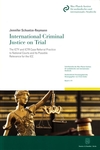Details

Schuetze-Reymann, Jennifer
International Criminal Justice on Trial
The ICTY and ICTR Case Referral Practice to National Courts and Its Possible Relevance for the ICC.
Duncker & Humblot
978-3-428-15136-3
1. Aufl. 2017 / 232 S.
Monographie/Dissertation
Kurzbeschreibung
Reihe: Schriftenreihe des Max-Planck-Instituts für ausländisches und internationales Strafrecht. Reihe S: Strafrechtliche Forschungsberichte. Band: 155
The 20th century has witnessed the rapid proliferation of a variety of international and internationalized criminal courts and tribunals. Their creation has been justified by the international community's resolve to punish perpetrators of the gravest crimes so as to contribute to restoring peace and justice to (post-)conflict regions. However, the specific contours of the relationship between these international courts and tribunals and relevant national accountability mechanisms continue to be the subject of some uncertainty, not least in light of the fact that national courts have increasingly begun to prosecute international crimes. Given the sheer scale of the crimes committed and the limited resources of international judicial institutions, it is crucial that these courts function in parallel with local courts in a pluralistic, integrative system of international criminal law. At the same time, parallel judicial activities are giving rise to an array of complex legal conundrums.
Conceived first and foremost as a case-reduction mechanism, the ICTY and ICTR case referral practice - as part of the UN Security Council Completion Strategy - is a novel experiment in the laboratory of international criminal justice. It illustrates in a highly concrete manner various legal challenges arising from pluralistic accountability mechanisms in the prosecution of international crimes. By analysing the legal problems highlighted by this practice, identifying possible normative and contextual root causes, and formulating potential solutions that may also be relevant for the International Criminal Court (the latter of which is contemplating its own »completion« scenarios), the author sheds light on the shifting dynamic between the main actors involved in the prosecution of international crimes.
